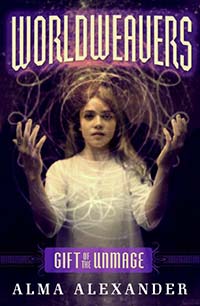Getting Caught Up on Reviews
 April 5th, 2008 by jules
April 5th, 2008 by jules
Happy Saturday, dear readers. I’m going to get right to it today: Here is my attempt to catch up on some book reviews, both titles from last year. I’m, uh, really slooooooooow sometimes, but better late than never.
 If dark humor is your thing — and I mean moments of incredible pathos that rattle your heart in your chest a bit while, somehow, also make you laugh simultaneously — here’s a new title for you, Gone and Back Again (Soft Skull Press, 2007) by Jonathon Scott Fuqua (based loosely on “the author’s own strange childhood,” according to his site). Fuqua is the award-winning author of four YA novels, a graphic novel (also geared at adults), and one book for young children. This is his first novel for adults, though I say it has tremendous cross-over appeal to teens.
If dark humor is your thing — and I mean moments of incredible pathos that rattle your heart in your chest a bit while, somehow, also make you laugh simultaneously — here’s a new title for you, Gone and Back Again (Soft Skull Press, 2007) by Jonathon Scott Fuqua (based loosely on “the author’s own strange childhood,” according to his site). Fuqua is the award-winning author of four YA novels, a graphic novel (also geared at adults), and one book for young children. This is his first novel for adults, though I say it has tremendous cross-over appeal to teens.
Middle-schooler Caley; his brother, Fulton; and his sister, Louise, are being dragged from town to town by his mother, who has “changed after the divorce. It was like her goodness and affectionateness seemed to be hibernating or were gone.” Caley, whose father is capable of moments of undeniable cruelty and a master of the fine art of guilt-tripping, must acclimate himself to life with his mother’s new boyfriend, Henrico, “who was a total jerk to us kids.” His mother occasionally attempts to convey affection but mostly fails (“I wanted my mom to be like a mom instad of just a woman we sometimes saw”). “For me,” Caley tells the reader, “life was like a train passing into a tunnel just before an avalanche falls and blocks the way out.” Thus, Caley starts his “days of badness,” drinking and stealing: “I was the kind of kid who, even if you wanted to, you didn’t care about.”
Caley’s family — his siblings, mother, and Henrico, that is — eventually settle in Ozarks, Missouri, in the middle of winter (when his younger sister questions one day why God can’t make things normal in their family, Caley responds, “{m}aybe Missouri is outside of his control . . . like Hell or something”). Caley — already depressed, an alcoholic, a thief, the result of some pretty screwed-up parenting, and someone who, likely, suffers a chemical imbalance (and often has a hard time breathing from the intense anxiety in his life) — determines all his problems lie elsewhere: the bleak town in which he now lives, Star Trek, the strange smell in his new bedroom, you-name-it.
This is not the novel for the avoiders-of-bleak, yet I bemoan the fact that many readers may miss Caley’s tale for that reason. There are moments of real poignancy here (particularly in the one friendship Caley establishes in Missouri with another misfit named John, rarely at school, who “has health issues” — but whose father actually beats him, ultimately sending him to the hospital — and who is writing his own “Hobbit-like book now, except mine’s called The Midget Lord“), leaving Caley to decide “Missouri was similar to the Bermuda Triangle, from what I heard, except on land. Everything always vanished and never returned, like furniture, my friend John, and my old self.” And Duqua is capable of some arresting metaphors, striking — all at once — in their naivete, severity, and Holden-esque candor: “If I’d have imagined what a skydiver who pulls his cord and the parachute comes out balled-up thinks, I bet it’s, I have just ruined everything. That’s what I was starting to think, too” and “{t}wice in two days, a grownup had threatened to beat me ’til I bled. Sad for that and everything, I looked at the stars that seemed like chopped bone parts on X-ray film, and I nearly wanted to die.”
But, ultimately, this is a survivor’s story, Caley rising from his depression and even able to talk to his father and let his pathologies bounce right off him (for the most part): “I’d just talked to my dad, and I felt alright. My father’s weirdness and comments hadn’t pried open my heart and formed an expanding hole of lava and emptiness. My father was just my father. Nothing more. It was a good position for him to take.” Don’t expect a Hallmark ending, but thank the high heavens for that.
I hesitate to call this tale a “quirky” one, as “quirky” gets so overused in children’s and YA reviewing and makes things a bit too cutesy, something this book decidedly is not. Let’s say “offbeat,” as the author himself does. Recommended for fans of the darkly humorous and those novels possessing a voice unsparing in its honesty.
{And bonus, which has nothing to do with the narrative: The book has one kickin’ dedication, which stood out for me. Anyone else like a memorable dedication?}
 Worldweavers: Gift of the Unmage (Eos, an imprint of HarperCollins, 2007) by Alma Alexander tells the story of Galathea Winthrop, or Thea, born a Double Seventh, or the seventh child of parents who had themselves been seventh children (“the most magical of the magical”). Great things and big accomplishments are expected from Thea, but Hermione she ain’t. Her magical abilities are far from stellar, as her older brothers like to point out and as her father’s disappointed looks make clear. As a result, her desperate parents send her through a time portal to Cheveyo, a First World shaman in the southwest (who belongs to an extinct group of people called the Anasazi), the only person not impressed by her lineage. There, Thea meets Grandmother Spider, Trickster, and many other unforgettable Old World inhabitants, and she also learns that she does, indeed, have her own unique powers (which I found quite mesmerizing. I don’t want to give away too many plot spoilers, but it involves “ribbon{s} of woven sunlight,” dreams, and a particularly enchanting handiwork Thea discovers she possesses). Successfully discovering them is a feat in its own right, considering Cheveyo’s often cryptic — yet ultimately illuminating — words: “The answers are within you—the answers to all important questions are already within you. It is in learning how to ask the questions of our lives that those questions are answered . . . ” (which is so very Rilke, no? And why does that amazing poster have to cost $150, by the way. But I digress). After Cheveyo instructs Thea to go home and “pick my own battlegrounds for the battles I’d have to fight,” she ends up at the very antithesis of Hogwarts: The Wandless Academy, a boarding school for those who cannot perform magic — or, as Thea dubs it, the Last Ditch School for the Incurably Incompetent. Eventually, Thea faces an evil presence, and her friends — otherwise, declared magically-challenged — are able to assist Thea on this new “battlefield” she has chosen.
Worldweavers: Gift of the Unmage (Eos, an imprint of HarperCollins, 2007) by Alma Alexander tells the story of Galathea Winthrop, or Thea, born a Double Seventh, or the seventh child of parents who had themselves been seventh children (“the most magical of the magical”). Great things and big accomplishments are expected from Thea, but Hermione she ain’t. Her magical abilities are far from stellar, as her older brothers like to point out and as her father’s disappointed looks make clear. As a result, her desperate parents send her through a time portal to Cheveyo, a First World shaman in the southwest (who belongs to an extinct group of people called the Anasazi), the only person not impressed by her lineage. There, Thea meets Grandmother Spider, Trickster, and many other unforgettable Old World inhabitants, and she also learns that she does, indeed, have her own unique powers (which I found quite mesmerizing. I don’t want to give away too many plot spoilers, but it involves “ribbon{s} of woven sunlight,” dreams, and a particularly enchanting handiwork Thea discovers she possesses). Successfully discovering them is a feat in its own right, considering Cheveyo’s often cryptic — yet ultimately illuminating — words: “The answers are within you—the answers to all important questions are already within you. It is in learning how to ask the questions of our lives that those questions are answered . . . ” (which is so very Rilke, no? And why does that amazing poster have to cost $150, by the way. But I digress). After Cheveyo instructs Thea to go home and “pick my own battlegrounds for the battles I’d have to fight,” she ends up at the very antithesis of Hogwarts: The Wandless Academy, a boarding school for those who cannot perform magic — or, as Thea dubs it, the Last Ditch School for the Incurably Incompetent. Eventually, Thea faces an evil presence, and her friends — otherwise, declared magically-challenged — are able to assist Thea on this new “battlefield” she has chosen.
Though I’ve referenced the Harry Potter books twice already, it’s too simplistic to compare this book, the first in a trilogy, to that saga. There’s much more here, including elements of Native American culture and ancient mythology — as well as a dose of contemporary school life for a girl eager to prove her skills. Thea might be time-travelling and struggling with magic to face nefarious forces, but her situation rings universal for teens struggling to come to terms with their identity (or, as KLIATT’s review put it, “Alexander’s novel will appeal to anyone who has ever secretly wished for an undiscovered talent that would change his/her life”).
KLIATT also wrote “{o}ccasional convenient plot devices and the young-adult mindset of the heroine may make this book slightly too elementary for the advanced or discerning fantasy reader, but in all other senses it is a perfect, page-turning weekend companion.” Indeed, I had some struggles in the beginning letting myself into the world Alexander created, feeling some of the prose a bit weighed down, but once Thea met Cheveyo, I felt a particular grace and fluidity entered Alexander’s writing. And, as Booklist wrote, “Alexander does an exquisite job of showing Thea’s growth, her ability to maintain her own counsel, and her boldness.” To experience Thea’s coming-into-her-own became a delight.
Realms of Fantasy calls this “{a}n excellent start to a new series with a fascinating premise.” Fans of fantasy, in particular, may want to note that the second in the trilogy was just released (and, according to Alma’s blog, #3’s already been written).
Until tomorrow, when we meet to declare kicks . . .

I agree with your take on Worldweavers; I had a hard time articulating just what the problem was that disinclined me to fully suspend disbelief until halfway through. I did like the school – and the computer thing is completely quirky — I really liked it. I’d read the sequel, which is high praise for something that was a bit uneven.
I ALWAYS read dedications and appreciate the good ones – you’re not the only one!